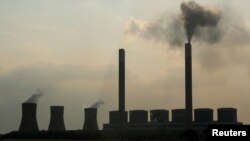Work is underway to accelerate the procurement of additional capacity, according to a presentation seen by Reuters on Tuesday from the National Energy Crisis Committee, set up by President Cyril Ramaphosa.
It said the committee is working to "develop emergency legislation which can be tabled in Parliament to allow energy projects to proceed more quickly and enable coordinated and decisive action."
Aging coal-fire power stations, underinvestment in new capacity and foot-dragging on policies to encourage private providers has left South Africa facing constant power cuts.
The NECC presentation said the committee is working to "develop emergency legislation which can be tabled in Parliament to allow energy projects to proceed more quickly and enable coordinated and decisive action."
It added that a "web of bureaucracy" was making it difficult to deal with the power crisis and that "the current regulatory framework wasn't designed to deal with an energy shortfall".
The document noted that progress has been made on the Energy Action Plan that was announced by Ramaphosa in July, including raising licensing requirements for private embedded generation projects and importing power.
Ramaphosa is meeting different stakeholders this week to discuss ways to deal with the country's worst power cuts on record.
In one meeting where leaders of political parties were present, it was revealed that electricity shortages looked set to continue at least into 2024.
The largest opposition party, the Democratic Alliance, on Tuesday announced that it will go to court to halt the recent "unaffordable tariff increases" approved by the energy regulator.
The party also wants the implementation of rolling power cuts declared unconstitutional.
Leaders from smaller opposition parties and some businesses threatened legal action over the power cuts on Monday when they sent a lawyer's letter to outgoing Eskom CEO Andre de Ruyter and Public Enterprises Minister Pravin Gordhan.
